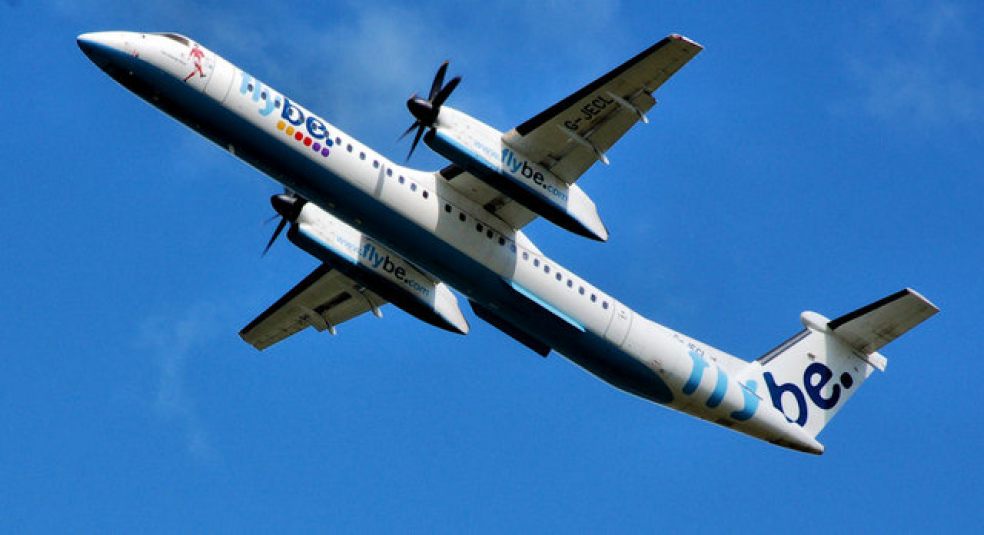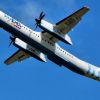
Flybe boss says job cuts are "about shrinking to grow"
This morning saw the announcement that Exeter based airline, Flybe is expecting to cut 500 jobs from its already reduced staff of around 2,700.
At a press briefing today the new CEO Saad Hammad explained the reasons behind a further reduction in staff despite a return to profitability this year.
Speaking at the briefing Hammad defended the job losses and shrinking the size of Flybe’s operation, suggested that the future of the Flybe training academy may be in jeopardy and stated that no area of the business would be secure against potential job cuts.
Mr Hammad said: “Unfortunately we’ve kind of strayed from that original mission over the years and built up an extensive cost list as a result of this.
“We’ve deployed too many aircraft and we’re going to have to ground some aircraft as we go forward, we’ve got too much frequency on too many routes, we’ve got too many routes which are simply unprofitable. So in essence it’s about shrinking to grow, shirking to a defensible, strong core which provides a solid foundation for growth.”
He continued: “We are strong in regional airports; we have the number one or two frequency share at most of the airports that we operate at and significant numbers of passengers who fly with us. So we have that solid foundation to build on but we’ve got to get more efficient and that’s why unfortunately we have to make these cuts.”
When asked for a timeline on the job cuts , he said: “We’re targeting to have a specific plan in terms of employees, routes and airports ready to enable the first wave of departures to happen at the end of January and the second wave to happen at the end of March.”
Mr Hammad also issued a challenge to airports over the passenger fees they charge the airlines indicating a plan to pressure airports into reducing their charges.
He said: “We’re going to engage with airports because its [airport charges] a big cost for us. I and my chief commercial officer Paul Simmons will be really upping the ante with airports because they can contribute big time to the process by lowering their passenger charges.
“Some airports are more expensive than others and we’re going to have serious conversations with a number of airports. It’s very, very important that we work in partnership that’s the real key here. I want to work with unions, staff representatives, all stakeholders and with airports I want to do t in partnership with them for the greater good.
“We have a shared interest with airports; we’re the champion of regional aviation the airports have a big role to play. They can be an enabler or a barrier and I’m hoping they can be an enabler.
“These cuts are an enabler for us to realise the vision to be the unrivalled provider of regional connectivity. It’s all a means to an end, not an end in itself to make sure we can serve to regions economically for a long time to come.
“Ultimately our agenda is about growth; profitable growth, secure growth and defensible growth. There’s good growth and bad growth. Bad growth is unprofitable, unsustainable and not from a efficient cost structure.”
When asked if Exeter’s engineering and management jobs are secure he said: “we’re not focusing this exercise on frontline staffing bases this job cut is across the board and it starts at the top. Look at what I’ve done to streamlining the senior management because we simply could not afford to have all these senior managers, it starts at the top.
“We’re not focusing these cuts on frontline staff only; it’s going to be shared across the business. It’s not the fault of the workforce it’s unfortunate that we have to do what we have to do but the job cuts will not be focused on operational staff only.
When asked if the Flybe training academy based in Exeter was part of the bad growth period, Hammad said: “absolutely, it adds complexity and cost to what we do and it’s not really core to an airline. But we have it and we’re reviewing what we can do with it just like every other aspect of the business.
“We want to be efficient and remove as much cost and complexity as possible to serve the region as economically and sustainably.
One of the biggest costs to regional airlines comes from
"I believe there’s a bright future but it’s not going to be handed to us on a platter. We have to fight and earn it and thats why we’re taking the action we’re announcing today.
I think airline passenger duty is particularly punitive for a domestic airline like us as on return domestic flight the airline has to pay the duty twice whilst a short haul international traveller will only have to pay it on the outbound leg.
"It’s wrong, it’s unfair and it doesn’t make any sense. But I’m not going to use it as an excuse not to tackle the poor issues we have in the business beyond the punitive effect of the duty. I will continue to lobby the government to change the duty to find a better way, a more equitable way.
"We have a proposal in mind which we’re discussing with politicians but I can’t say too much about it right now.
"It’s too early to say at this stage we’re in the process of discussing it with unions
"We are doing a review of non-core activities. I can’t get into specifics but we have to do whatever it takes to make sure we secure the future of the company.
"I believe there’s a bright future but it’s not going to be handed to us on a platter. We have to fight and earn it and that’s why we’re taking the action we’re announcing today.
"We’re a different beast [from other airlines]. Fundamentally Easyjet and Ryanair are bucket and spade operations. That’s not what we do we focus on connecting the regions and that’s a market that the Ryanairs of the world can’t readily address their planes are too bug, they can’t economically serve these regions, but we can and that’s the power of our model.
"But we need to address it in a defensible and efficient way to be successful in this process.
"We need to shrink to grow, we need to do these tough things but I’m really optimistic about the long-term for this business. We can be the best local airline not just in the UK, but in Europe too."



















